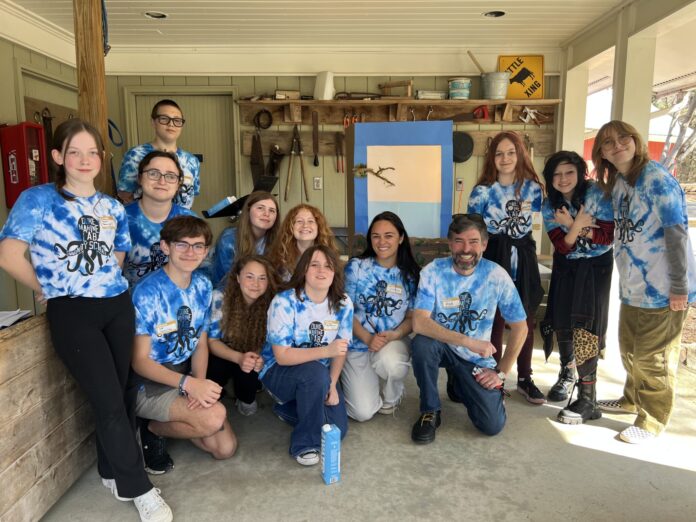Growing up on the Intracoastal Waterway in Eastern North Carolina has been a blessing. I have fond childhood memories of playing in the surf. As a parent, I enjoy seeing my sons have a similar upbringing and love watching them experience the same spectacular sunrises and sunsets over the water.
Today, I teach 8th grade English and Language Arts (ELA) at Broad Creek Middle School in Carteret County — the same middle school where my mother taught exceptional children and I attended as a student. My eldest son is now in 7th grade at that same school. Truly, it feels like a full-circle moment.
Along the Outer Banks, my students and I are no strangers to severe weather events. In 2018, Hurricane Florence caused widespread damage in Carteret County leaving residents without power for 10 days and closing schools for two weeks. Many homes took months to repair and more than 80 displaced families have yet to return.
In 2019, Hurricane Dorian made landfall in Ocracoke causing water damage in Carteret County and intensifying the community’s heightened anxiety. My family was staying in a townhouse on Emerald Isle and our neighbor’s roof caved in. Debris was collected on the side of roadways and could be seen for miles.
Carteret County experienced no major hurricanes in 2020, but the COVID-19 pandemic disrupted schools, leading to remote learning for most of a semester. The gradual return to in-person classes was slow and students continue to feel the lasting effects of the global quarantine. These experiences can be traumatic, underscoring the importance of preparing our students to face environmental and personal challenges head-on.
Teaching resilience
One way to help students thrive in the face of adversity is by teaching resilience. Personal resilience is the ability to confront life’s challenges by leveraging one’s strengths, building networks, and learning from each experience to emerge stronger and more adaptable. Resiliency is a skill that everyone needs, but especially middle schoolers, who are navigating a crucial stage of development.
Middle school is a time of growth, exploration, and trial and error. Students are learning to balance increased independence with the challenges of academic and personal responsibilities. Without resilience, students risk becoming discouraged by setbacks. Teaching them resilience skills — like persistence, problem-solving, and collaboration — ensures they have the tools to succeed inside and outside the classroom.
In the spring of 2024, I received an opportunity to design curricula focusing on building resilience through storytelling as part of my fellowship with the Kenan Fellows Program for Teacher Leadership at N.C. State University. I was one of four Carteret County Schools educators who were selected to collaborate with the Duke University Marine Lab Community Science Initiative.
Our charge was to develop lesson plans focusing on themes of personal, community and ecological resilience as part of the lab’s “Ready. Set. Resilience.” initiative. For my part, I designed an interdisciplinary program that explores resilience through fables. As an ELA teacher, I collaborated with an 8th grade science teacher at my school to integrate ecological concepts into storytelling.
By personifying environmental challenges through fables, students develop a connection to the natural world and a greater appreciation for the delicate balance of ecosystems. The response from students has been overwhelmingly positive. They enjoy working with peers from different classes, engaging in creative activities like podcast production, and sharing their work with the community. Opportunities like recording fables for Duke University’s “Seas the Day” podcast and attending a PBS Education Unconference at the Museum of Life and Science in Durham have further fueled their enthusiasm and pride in their work. Seeing their growth and excitement has reaffirmed the value of this project.
As with any new initiative, we faced some skepticism, particularly from parents concerned about the emotional and behavioral aspects of the program. By remaining transparent and allowing the project’s success to speak for itself, we gradually earned their support. Hearing their children’s excitement about the workshops helped shift perspectives and build trust.
At the end of the school year, our community was able to appreciate our students’ stories in a podcast that we syndicated. Additionally, we held a community event at Broad Creek Middle School titled “Fable to Table.” Our students made posters promoting their fables with QR codes that would redirect the participant to our podcast where they could listen to our students narrate their stories. All of our extracurricular student organizations were present along with food trucks to feed our audience.
Learn more
I’m excited to share more about our work in an upcoming virtual workshop at 5:00-6:00 p.m. EDT on Tuesday, April 22, 2025. The session, “Fostering Ecological, Community, & Personal Resilience Through Fables,” is the final installment of Not Your Average PD, a free professional development program presented by the Kenan Fellows Program for Teacher Leadership.
Within this workshop, I will engage participants with nature-based narratives to explore resilience-building concepts through storytelling and equip educators with strategies for integrating these themes into classroom instruction. The session is free and open to all educators. Register at kenanfellows.org/nyapd.





